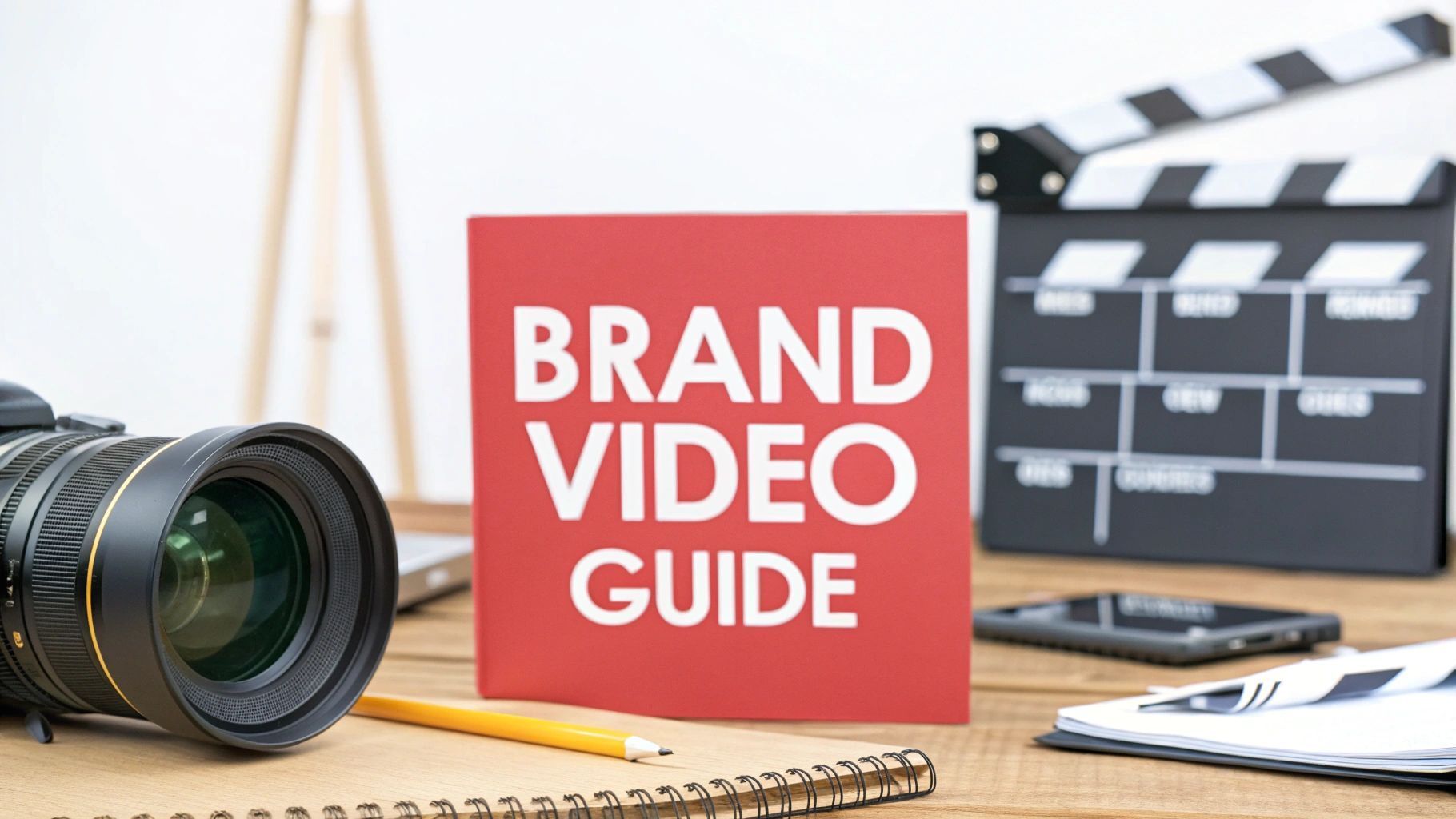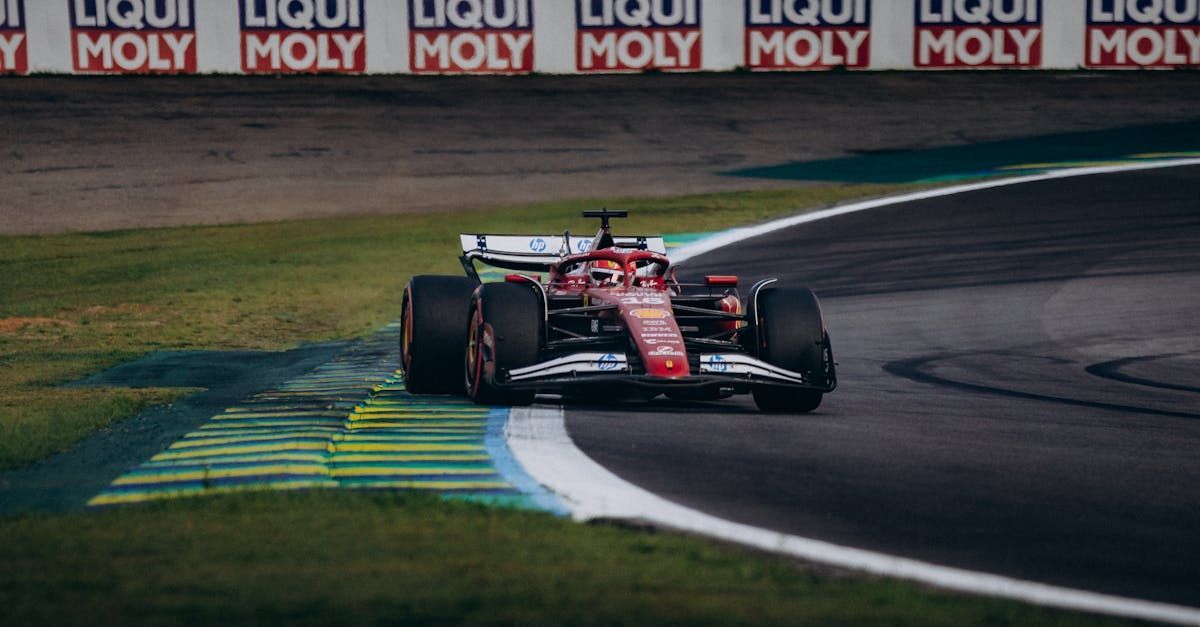Choosing an Ecommerce Ad Agency to Grow Your Brand
An ecommerce ad agency is a specialist growth partner for online brands. Their entire world revolves around driving sales and revenue through razor-sharp advertising campaigns. Unlike general marketing firms they live and breathe the nuances of online retail, optimising every single click for conversion and scalable growth.
What an Ecommerce Ad Agency Actually Does
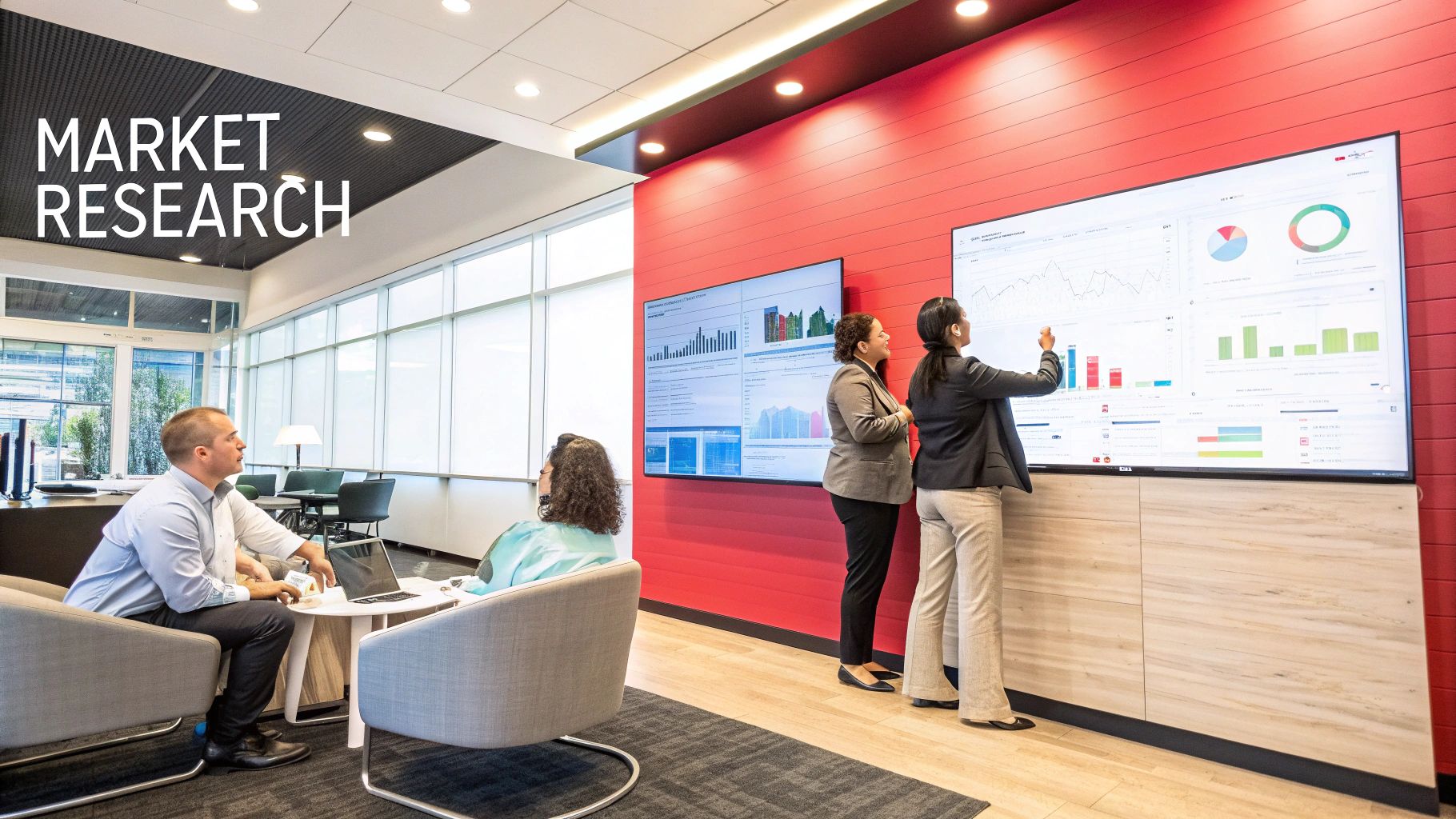
Think of an ecommerce ad agency less like a service provider and more like your brand's expert pit crew. If your online store is a high-performance racing car this agency is the team of specialists constantly fine-tuning every part to make sure you win the race for customer attention and ultimately sales. Their job goes way beyond just "running ads".
These agencies are strategic assets focusing squarely on the unique challenges and opportunities found only in the online retail space. They understand the entire customer journey, from the first time someone sees your ad to the final click on the checkout button. This deep specialisation is what really sets them apart from broader marketing firms. You can get a clearer picture by understanding what a digital marketing agency does in a more general sense.
A Laser Focus on Growth and Conversion
At its core an ecommerce ad agency’s mission is to generate a measurable, tangible return on your investment. They pull this off by blending creative strategy with hardcore data analysis, building campaigns that don't just attract traffic but actually convert that traffic into paying customers.
To give you a clearer idea here’s a quick summary of the key areas they handle.
Core Functions of an Ecommerce Ad Agency at a Glance
| Function | Description | Primary Goal |
|---|---|---|
| Paid Search & Social Ads | Managing campaigns on platforms like Google, Meta and TikTok to reach high-intent buyers and build brand awareness. | Drive qualified traffic and direct sales. |
| Conversion Rate Optimisation (CRO) | Analysing website user behaviour to remove friction points and streamline the path to purchase. | Increase the percentage of visitors who buy. |
| Creative & Copywriting | Developing compelling ad visuals and text that resonate with the target audience and prompt action. | Capture attention and persuade users to click. |
| Data Analysis & Reporting | Continuously monitoring campaign performance, tracking key metrics and providing clear, actionable insights. | Make informed decisions to improve ROI. |
Essentially their work is a continuous cycle of testing, learning and optimising to ensure every penny of your ad spend is working as hard as it possibly can.
In essence, an ecommerce ad agency's value lies in its ability to translate advertising spend directly into revenue. They are not just managing campaigns; they are building a predictable and scalable sales engine for your business.
A Strategic Partner in a Crowded Market
The world of online retail is getting more competitive by the day which makes having an expert team in your corner more crucial than ever. A good agency acts as an indispensable ally for any brand that's serious about achieving real, scalable growth in a market that doesn’t stand still. They’re the difference between simply participating and actively dominating your niche.
The Core Services That Drive Real Growth
An ecommerce ad agency doesn't just run ads; it builds a growth engine for your brand. Think of it less like a list of services and more like a specialised toolkit where each tool has a specific job but works best when used as part of a single, cohesive strategy.
At the sharp end of the toolkit is Pay-Per-Click (PPC) advertising . This is all about getting your products in front of customers the very moment they’re ready to buy. It’s the digital equivalent of renting a premium billboard on the world's busiest high street but one that only shows up for people actively looking for what you sell.
A data-savvy Google Shopping campaign for example can turn someone’s search for "waterproof running shoes" into an immediate sale. The agency's job is to manage the bids, target the right keywords and polish your product listings to make sure you appear right at the top, grabbing that high-intent traffic before your competitors do.
Targeted Social Media Campaigns
Next up is the art of social media advertising on platforms like Meta and TikTok. This is less about the instant sale and more about building a community and creating desire. It’s like setting up an incredible pop-up shop at a massive festival where all your ideal customers are already hanging out.
An agency might run a campaign on Instagram Stories for a new fashion line using slick video content to target users who’ve shown an interest in sustainable clothing. By reaching people where they spend their downtime these campaigns build brand awareness and drive traffic from customers who weren't even actively searching for you. A huge part of any agency's role is to help businesses increase ecommerce conversion rate by weaving these different touchpoints together.
The real magic happens when PPC and social media work in tandem. A customer might first see your brand in a TikTok video, get curious and then later see a Google Shopping ad that nudges them to finally make the purchase. It creates a seamless journey from discovery to checkout.
Capturing Organic Traffic with SEO
Finally there’s Search Engine Optimisation (SEO) , the long-game strategy that builds a rock-solid, sustainable foundation for growth. Paid ads are great but they stop the second you stop paying. SEO is different. It’s about earning your website a permanent, high-ranking spot in search results. Think of it as owning your retail space instead of just renting it.
An ecommerce ad agency gets this done by:
- Optimising Product Pages: This means fine-tuning titles, descriptions and images to perfectly match what your customers are searching for, helping your products climb the rankings organically.
- Building High-Quality Backlinks: When other reputable websites link to your store it’s like a vote of confidence. It tells search engines that you're a trustworthy authority in your field.
- Creating Valuable Content: Publishing genuinely useful blog posts or guides (like "How to Choose the Right Hiking Boots") doesn't just attract customers looking for information; it cements your brand as the go-to expert.
Put it all together and you have a powerful, self-reinforcing system. PPC delivers the quick wins and immediate sales. Social media builds your audience and brand story. And SEO secures your long-term visibility, ensuring a steady stream of customers for years to come.
Why Partnering with an Agency Makes Business Sense

Understanding what an ecommerce ad agency does is one thing. Realising the tangible advantages of bringing one on board is another entirely. The decision isn't just about offloading tasks; it's a strategic investment in expertise, efficiency and accelerated growth.
For many brands the most immediate win is gaining instant access to a full team of specialists. Think about it: you get seasoned copywriters, data analysts, media buyers and strategists in your corner from day one. All without the headache and expense of hiring an in-house team, bypassing recruitment costs and lengthy onboarding. You plug directly into a pre-built engine of expertise.
Achieving a Stronger Return on Investment
A huge advantage of working with an experienced agency is their obsession with data. They're wired to eliminate guesswork and wasteful ad spend by focusing only on strategies that deliver a measurable return. By constantly analysing performance and fine-tuning campaigns they make sure every pound you spend works as hard as it possibly can.
This focus on performance is driving the entire industry forward. In the UK the digital advertising sector is projected to hit £20.4 billion by 2025. That growth is fuelled by a powerful return on investment where medium to large firms see an average return of £4.11 for every £1 spent .
An agency also brings an invaluable objective perspective. They’ve seen what works (and what doesn't) across dozens of industries and can apply proven tactics to your brand that you might never have considered. You can explore the benefits of outsourcing your marketing to get a deeper sense of this value.
Unlocking Scalability and Seizing Opportunities
Perhaps the most powerful benefit is the ability to scale. When a market opportunity appears you need to act fast. An agency gives you the agility to ramp up your marketing efforts almost overnight, whether you're launching a new product or reacting to a sudden surge in demand.
A great ecommerce ad agency acts as a growth accelerator. They provide the specialised knowledge, advanced tools and strategic agility needed to scale your brand faster and more efficiently than you could alone.
This isn’t just about throwing more money at ads. It's about intelligently allocating resources to the most profitable channels—a task that requires deep expertise and sophisticated tools that most businesses simply don't have.
Here’s a quick breakdown of how a partnership fuels your growth:
- Access to Advanced Tools: Agencies invest heavily in expensive marketing software and analytics platforms, giving you enterprise-level tech without the hefty price tag.
- Time Savings: Outsourcing your advertising frees you and your team to focus on what you do best, like product development and customer service.
- Expert Oversight: You get a team that lives and breathes ecommerce advertising. They stay on top of platform changes and new trends so you don’t have to.
Ultimately partnering with the right ecommerce ad agency is about building a more resilient, profitable and scalable business. It transforms advertising from a necessary cost into a predictable driver of revenue.
Key Platforms and Modern Advertising Strategies
Having a great product is one thing but getting it in front of the right people at the right time is a different game entirely. Success in modern ecommerce advertising comes down to mastering the right platforms with the right strategies. An experienced agency knows that every digital channel is a unique opportunity to connect with customers and their real skill lies in building sophisticated campaigns that work together as one.
A non-negotiable principle today is a mobile-first approach . This isn't just a trend; it's the reality of how people shop, especially in the UK. The shift is massive with smartphones now accounting for 58.34% of digital ad revenue in 2024, making it the biggest piece of the pie. Why does this matter so much? Because mobile allows for incredibly precise targeting through techniques like programmatic advertising, putting your ads exactly where they need to be.
Mastering the Major Platforms
To build a powerful advertising engine agencies focus on the platforms where your customers are already spending their time. Each one serves a very different purpose.
-
Google Ads for High Intent: When someone types "buy running shoes for marathon" into Google they're not just browsing—they're ready to buy. Google Ads especially Shopping campaigns are designed to capture this exact moment of high intent. An agency’s job here is to make sure your products show up at the top, turning that search into a sale.
-
Meta for Community and Discovery: Platforms like Facebook and Instagram are different. People are there to connect and discover, not necessarily to shop. The goal here is to create desire. Agencies use stunning visuals and clever campaigns to introduce your brand to people who fit your ideal customer profile, nurturing them from that first spark of awareness to an eventual purchase.
-
TikTok for Engagement and Reach: If you want to connect with new, often younger, audiences TikTok is in a league of its own. The platform thrives on creative, authentic content that entertains and feels real. A smart TikTok strategy can generate incredible brand awareness and even make your products go viral.
This infographic breaks down some of the typical performance differences between two of the biggest players, Google Ads and Facebook Ads, on a couple of key metrics.
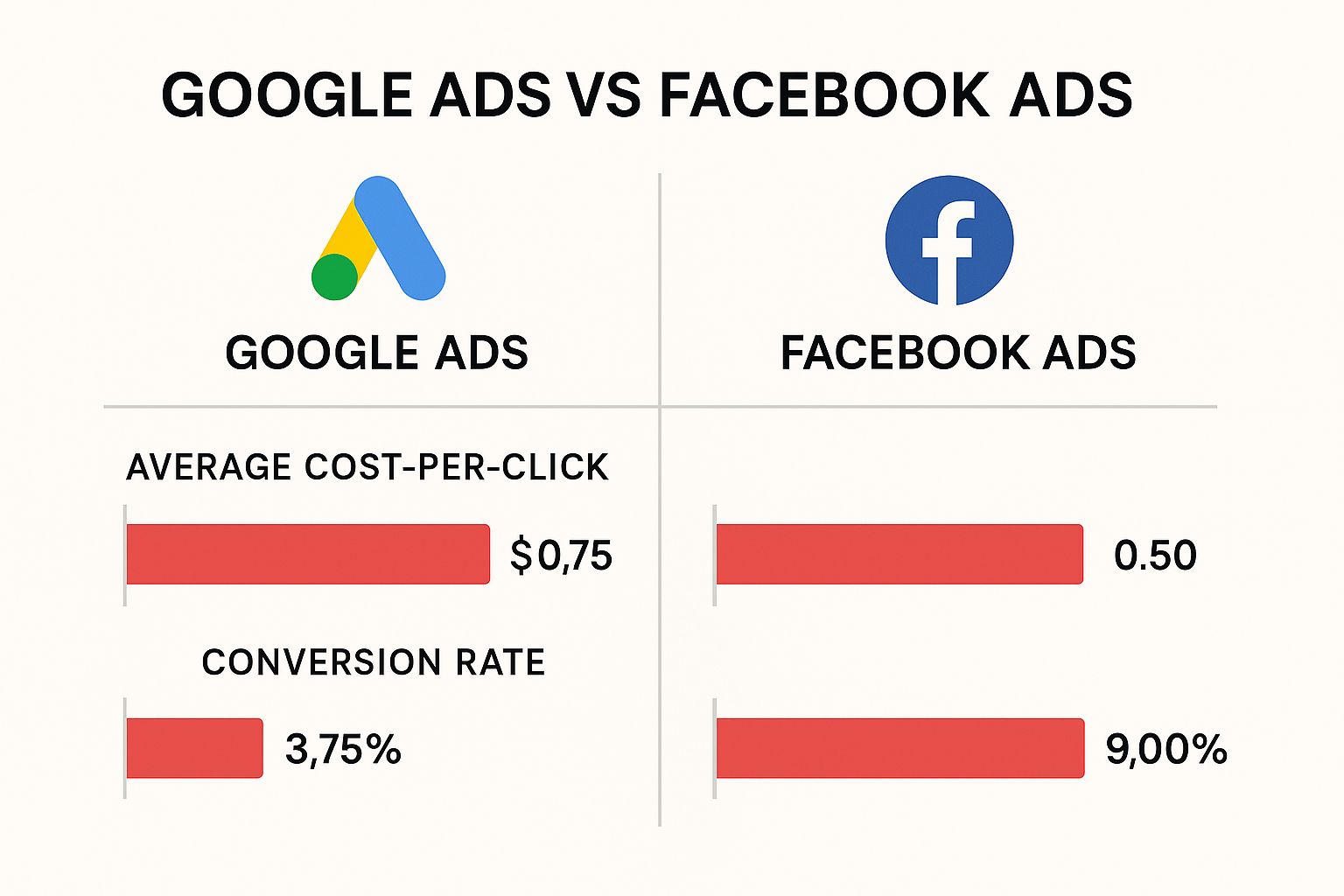
As the numbers suggest Google Ads often drives higher conversion rates because users are actively searching for what you sell. On the other hand Facebook Ads can offer a lower cost-per-click, making it a brilliant tool for building brand awareness and reaching new audiences.
Platform Strategy Comparison for Ecommerce Brands
Choosing the right mix of platforms is crucial for any ecommerce brand. The table below outlines where each major platform shines and how they can fit into your overall marketing strategy.
| Platform | Primary Strength | Ideal for |
|---|---|---|
| Google Ads | Capturing high-intent search traffic | Driving immediate sales from customers ready to buy |
| Meta (Facebook & Instagram) | Detailed audience targeting and brand discovery | Building a community and nurturing leads through the funnel |
| TikTok | Viral reach and authentic user engagement | Reaching younger demographics and boosting brand awareness |
| Visual discovery and purchase inspiration | Brands in visual niches like fashion, home decor and DIY | |
| Amazon Ads | Reaching shoppers directly on the marketplace | Driving product sales within the Amazon ecosystem |
Ultimately the best approach isn't about choosing one platform over another. It's about understanding how they can work together to create a seamless experience for your customers, guiding them from discovery to purchase and beyond.
Creating a Unified Customer Journey
This is where true agency expertise comes into play: weaving all these different channels into a single, cohesive customer journey. They use programmatic advertising to place automated, highly targeted ads across the web, making sure your brand is always front and centre. You can get a deeper understanding of this in our guide where search engine marketing is explained in more detail.
By integrating platforms, an agency ensures that a customer who discovers a product on Instagram is later reminded of it with a display ad and finally converts through a Google search. This creates a powerful, multi-touchpoint strategy that maximises conversions and builds lasting brand loyalty.
How to Choose the Right Agency for Your Brand
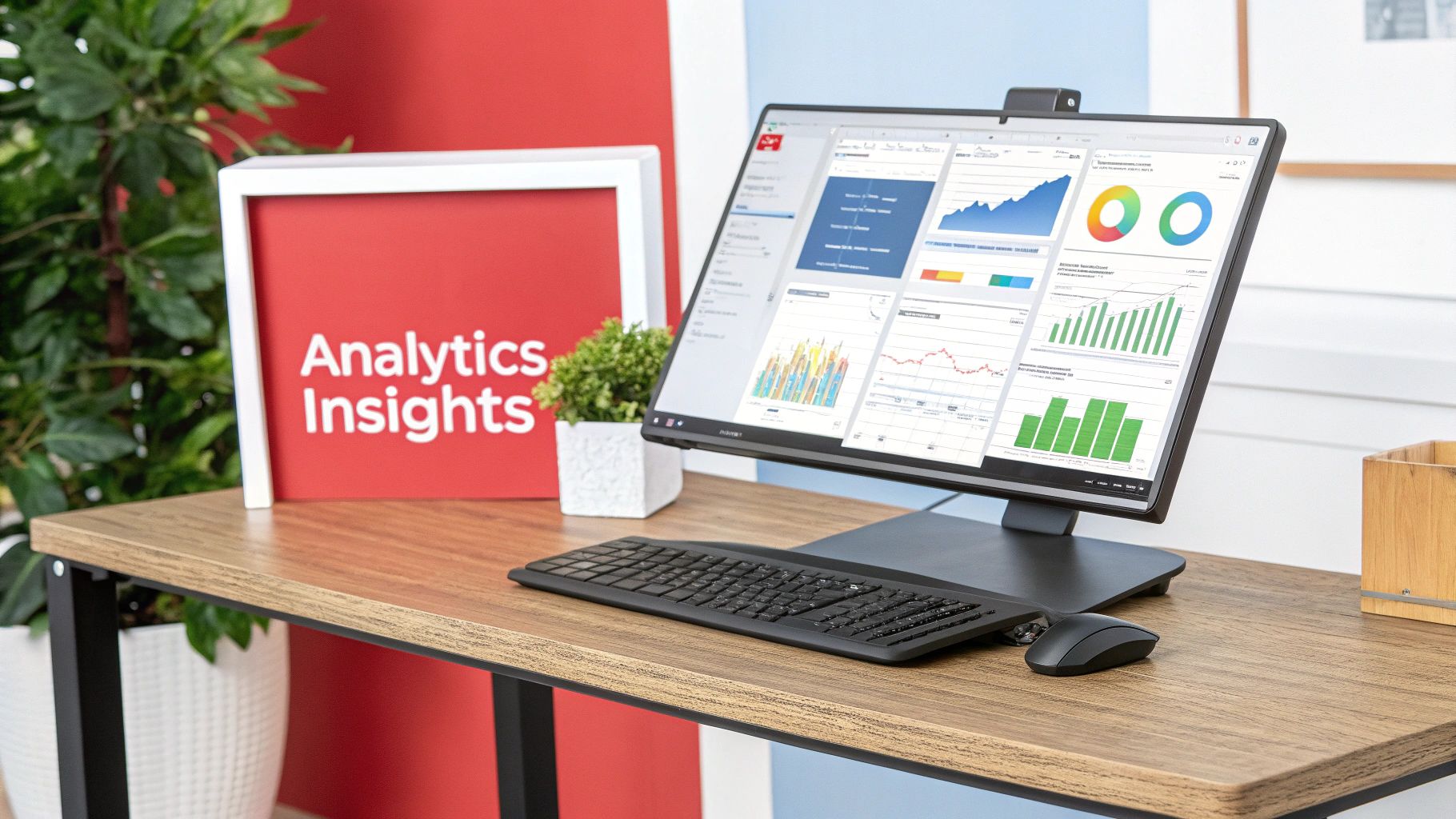
Finding the perfect ecommerce ad agency can feel like searching for a needle in a haystack. But it doesn't have to be overwhelming. The secret is to have a clear, practical framework for making your decision.
Think of it less like hiring a supplier and more like bringing on a long-term partner. You want someone who’s genuinely invested in your success.
The right agency should feel like an extension of your own team. Their goals should mirror yours and their success should be directly tied to your growth. This means looking past the slick presentations and focusing on real proof and genuine alignment.
Evaluate Their Track Record and Industry Fit
Before you even start talking do some digging into their past work. A great agency will be proud to show you case studies and results from brands similar to yours. Don’t just look for big names; look for success stories in your specific niche.
An agency that’s a genius at growing fashion brands might not have a clue where to start with a B2B electronics company. Proven experience in your sector means they already get your customer, your challenges and the competitive landscape. That specialist knowledge massively shortens the learning curve and gets you better results, faster.
Ask them directly about their work with businesses of your size and with your specific goals. If you're a growing SME a history of helping brands scale from £1 million to £5 million is far more relevant than their work with global giants.
Prioritise Transparency and Communication
A strong partnership is built on trust and that starts with open communication. You need to know exactly where your money is going and what results it’s delivering. Vague promises and vanity metrics like 'impressions' should be a major red flag.
A trustworthy agency provides clear, easy-to-understand reports that focus on what actually matters: Return on Ad Spend (ROAS) , Customer Acquisition Cost (CAC) and conversion rates. They should be able to connect every penny spent directly back to your revenue growth.
Their communication style is just as important. Will you get a dedicated account manager? How often will you meet? A good cultural fit ensures your working relationship is smooth and productive, not a source of constant friction.
Ask the Right Questions During the Vetting Process
To make a smart decision you need to walk into those initial meetings prepared with specific, insightful questions. This is your chance to understand their strategic thinking, their team structure and how they handle things when they don't go to plan. It’s also wise to ask about how they are adapting to new technologies and these 10 AI Questions to Ask Your SEO Agency are a great starting point.
Here is a practical checklist to get you started:
- Strategic Process: "Can you walk me through your process for building a new client strategy from day one?"
- Team Structure: "Who exactly will be working on my account and what’s their level of experience?"
- Performance Metrics: "What key performance indicators (KPIs) do you think are most important for my business and why?"
- Client Onboarding: "What does your onboarding process look like and what will you need from us to get started?"
- Handling Challenges: "Can you share an example of a campaign that didn't go as planned and how you turned it around?"
By asking these kinds of questions you cut through the sales pitch and get a real feel for how the agency operates. This diligence is crucial for avoiding common pitfalls and finding a partner truly equipped to help your brand hit its long-term goals.
Answering Your Key Questions
Deciding to bring an ecommerce ad agency on board is a big move. It’s completely normal to have questions about how it all works in practice—from the costs and timelines to how you’ll actually know if it’s working.
Let’s get straight into the most common questions we hear from business owners. We’ll cover the financial side, how long it really takes to see a return and the metrics that actually matter, giving you a clear picture of what to expect.
What is the Typical Cost of an Ecommerce Ad Agency in the UK?
There’s no single price tag here. Agency costs in the UK swing quite a bit depending on what you need, your advertising budget and the agency's track record. That said, most pricing falls into one of a few common buckets.
You'll usually come across one of these models:
- Percentage of Ad Spend: This is a popular one. The agency takes a fee of between 10-20% of your total monthly ad budget.
- Fixed Monthly Retainer: You pay a set fee each month. This can be anything from £1,500 to over £10,000 , depending on the level of service.
- Hybrid Model: A mix of a fixed retainer plus a performance-based fee. This model is great because it ties the agency's success directly to your own.
The most important thing is finding an agency with a transparent pricing structure. Always get clarity on exactly what’s included in their fee—things like creative production, detailed reporting and strategy sessions—to make sure there are no surprises later on.
How Long Until I See Real Results?
Patience is a virtue here. While you can often see some early momentum within the first month especially with paid ad campaigns, it typically takes 3-6 months to see significant, sustainable growth from your investment.
This initial period isn’t just a waiting game; it’s an active phase of learning and fine-tuning. The agency uses this time to gather data, test different approaches and figure out what truly connects with your audience, optimising your campaigns for the best possible return.
For strategies with a longer fuse like SEO and content marketing you need to give them more time to build steam. For these a realistic timeline is closer to 6-12 months but the results tend to be far more durable, building a real asset for your brand. A good agency will manage your expectations from the start and provide a clear roadmap with milestones along the way.
What Metrics Should I Use to Measure Success?
Measuring success is all about tracking the numbers that directly affect your bottom line. Metrics like clicks and impressions are interesting but they don't pay the bills.
A solid agency will laser-focus on the KPIs that drive your business forward, including:
- Return on Ad Spend (ROAS): The big one. This shows you exactly how much revenue you’re making for every pound you spend on ads.
- Customer Acquisition Cost (CAC): This tells you precisely how much it costs to bring in a new customer.
- Conversion Rate: The percentage of people visiting your site who actually make a purchase.
- Average Order Value (AOV): The average amount a customer spends each time they buy from you.
Your agency should be providing you with regular, easy-to-digest reports that connect their work directly to your revenue growth. That’s how you know you’re getting real, concrete value.
Ready to unlock your brand's full potential? The team at Superhub specialises in creating bespoke growth strategies that deliver real, measurable results for ecommerce businesses. Visit us at https://www.superhub.biz to learn how we can help you thrive.
Want This Done For You?
SuperHub helps UK brands with video, content, SEO and social media that actually drives revenue. No vanity metrics. No bullshit.


